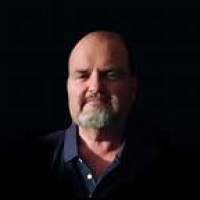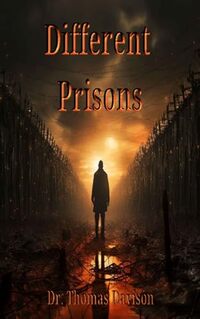What first inspired you to start teaching incarcerated individuals in Northern Ohio’s state prisons?
Eight years ago, I was diagnosed with PD- Parkinson's Disease. At the time, I was the Chair of Business for a successful program at a prestigious college in Ohio. The visual impacts from PD included severe tremors and dyskinesia, or uncontrollable jerking movements. My students felt uncomfortable. I resigned, but after three months, I went nuts from boredom. I accepted the first open adjunct position. It was teaching inside the prisons, a job not too popular. My incarcerated students were appreciative that anyone was willing to teach them face-to-face. They didn't care if I had three eyes and a set of horns. It has become the most rewarding job I have ever held.
How have your experiences working with felons shaped your perspective on rehabilitation and redemption?
As far as redemption is concerned, when I served in the U.S. Army during wartime, I developed a strong belief in second chances and redemption. When I began teaching inside the prisons, I soon realized that most of the felons had been raised without male role models and were high school dropouts. They desperately needed to learn that knowledge was power. They also needed to discover how a real man should behave.
The truth is, teaching these convicts is MY chance at redemption.
As a veteran, I have always held great pride and intense patriotism for our country. However, in a short period, it became apparent that the long arm of the law was indeed broken. Much of the criminal justice system is focused on punishment, not rehabilitation.
What inspired you to write Different Prisons and share your personal experiences with the world?
I had no choice in the matter. The day-to-day events that I witnessed on the ‘inside’ of the prisons affected me so much that I literally burned to find an outlet for those feelings. First, it was through poetry, then eventually short stories.
What led you to express your experiences through poetry and short stories?
I have loved poetry deeply for my entire life, but I have never considered myself a poet. I believe it was because I never had anything important enough to say. Now, I can’t seem to turn it off. My poetry is predominantly free verse, which lends itself well to the prison subject matter. I was surprised when my traditional poetry on non-prison topics won contests and awards.
Your book, “Different Prisons,” is described as “real-life stuff, not the Hollywood version.” What are some of the biggest misconceptions about prison life that you wanted to dispel?
Hollywood tends to portray prison convicts as ignorant, gangbangers who are completely devoid of intelligence, creativity, or the ability to change. Everything in the movies is clearly black and white, good versus evil. Prisons (just like the real world) are usually comprised of many shades of gray.
How did you choose which stories, poems, and anecdotes to include in “Different Prisons”? Were there any that were particularly difficult to write?
Good question, I used the spaghetti method. I threw everything against the wall and waited to see what stuck and what didn’t. This was made possible using an episodic writing platform where I received instant feedback as each episode/chapter was posted.
Can you describe your writing process? Do you draw directly from real-life events, or do you blend fact with fiction?
I don’t believe writing is a process with schedules, deadlines, and timelines. Writing is a craft and an art form. True art comes from within. Great art comes from the soul. My ‘process’ is to read great poetry, read books from the masters, and listen to music that moves me. This stirs my artistic and creative side and motivates me to create.
My nonfiction writing is always entirely based on real-life events. Otherwise, it wouldn’t be nonfiction; it would morph into creative fiction and should be labeled as such.
My fiction writing always includes content from real-life events in the story.
What made you choose Amazon Kindle Vella for publishing your novels in episodic format?
I answered that in a previous question, but please allow me to expand on my answer.
Kindle Vella was a wonderful platform to garner immediate feedback. It was like having dozens of beta readers. The original Vella became the first story draft that could be amended and corrected as you progressed.
Kindle Vella also awarded generous bonuses based upon a story’s popularity. I was very fortunate to receive tremendous monetary incentives for over a dozen Vellas. After publishing three of those stories that made more sales than I ever hoped for, the KV bonuses made double that money.
I donated one hundred percent of all my earnings to the 501 (c) (3) charity, Entrepreneurial Services for Felons, ESF, which provides training and support for ex-felons.
We end recidivism one felon at a time.
What kind of feedback have you received from readers - both those who have experienced incarceration and those who haven’t?
Overall, I am pleased with the feedback from the readers. I didn’t intend to write a book that was a call for action or to motivate the readers with a sweeping political statement. My goal was to write a true story (my memoirs) that would be informative and entertaining. I hope that I accomplished that.
My former and currently incarcerated students love the book. I have gifted hundreds of author copies to various efforts that these students give back to their communities. I am amazed by how many ex-felons dedicate their time to working with at-risk youths.
What inspired you to create the character of Kuni, an orphan with such a strong desire to become a warrior?
There is a shortage of literature for working with at-risk youth. I know this firsthand. I created The Boy With Strange Eyes as a tool to discuss bias, prejudice, and discrimination. I also created an audiobook of TBWSE for youth who have difficulty with their reading skills.
The protagonist, Kuni, is based on my childhood. I was a military brat who spent my formative years in Eastern countries. I was immersed in these cultures. For years, I was the sole ‘round-eye’ in my schools. I was indeed the boy with strange eyes. Kuni and I were both victims of child abuse. We both studied and mastered martial arts. We both experienced the taking of human life.
There are many other similarities, but I must beware of the spoilers.
Kuni is described as too small and too young to fish for a living, yet he embarks on an incredible journey. What do you think Kuni’s story teaches readers about perseverance and self-discovery?
Great question! First, I hope the young (and some older) readers learn many vital lessons from Kuni’s quest. Most importantly, the question posed to Kuni by the water spirit Mizuko is the story’s theme—what manner of a man do you wish to become?
The answer to Mizuko’s (the tiny water dragon made from sea mist) question is- You can become whatever you can dream of becoming. But great things require great effort. To succeed, you must put in the work required.
Have any of your students read your work, and if so, what were their reactions?
Most of my students have read my work and are my biggest fans. I started two Writing Clubs inside the prisons. In the Clubs, we discuss the craft of writing. They keep my voice honest and call me out if something isn’t spot on.
What can readers expect from the ending of Kuni’s journey? Without giving too much away, how does it conclude, and what emotional payoff do you hope it delivers?
Hopefully, readers will find the ending credible and realistic. One takeaway should be that Kuni’s willingness to be respectful and his small acts of kindness are rewarded tenfold.
Do you have plans to expand your writing into other genres or formats, such as memoirs or screenplays?
Funny you asked, I call myself The Man Without a Genre. I am an eclectic writer with novels in various completion stages, including memoirs, fantasy, horror, poetry, paranormal, mystery, Cthulhu Mythos, and a cookbook.
How satisfied are you with the overall experience of using AllAuthor?
I am enjoying the sense of community with other authors. Honestly, it is too soon to judge the rest.
I want to end with this excerpt from Different Prisons…
"My incarcerated students didn't need a reserved college professor- they needed hope. So- I gave them Doctor D- the persona who stood against the 'wrongness'- regardless of personal consequences. A male role model- a cantankerous old man who carried a hickory stick and wore a funny hat- treated felons like young soldiers in his personal army- a person in authority who defied the unjust rules- yet demanded his students maintain their dignity and self-respect, honesty, and integrity."
Finally, thank you to everyone involved for this opportunity to be interviewed. Shout out to Joshi Mady!










